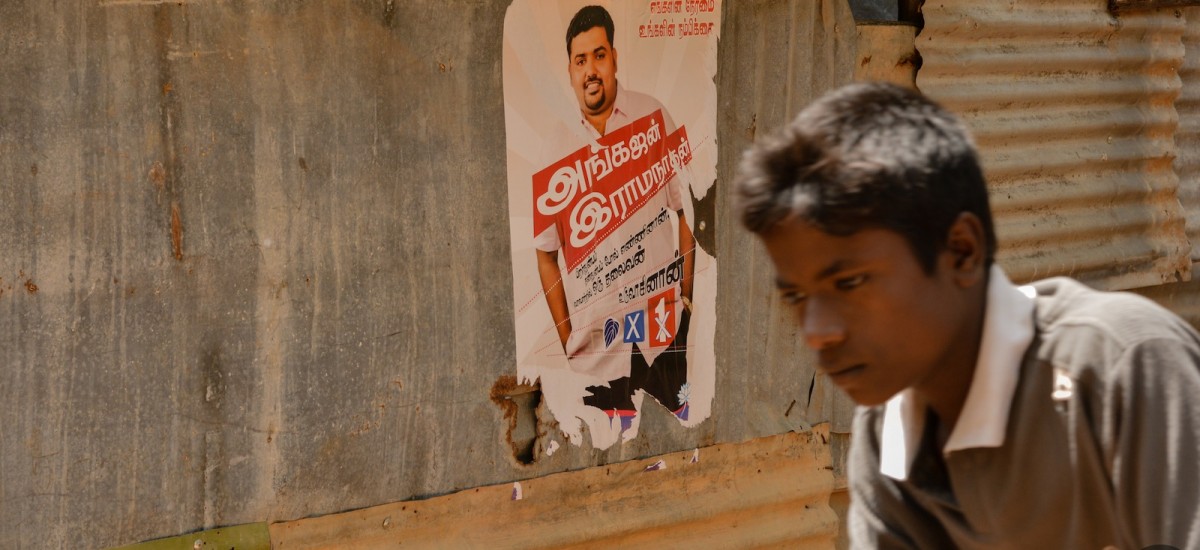As with every war the silencing of the guns or the signing of a treaty are often only a small step in a long journey of reconciliation. The true progress in rebuilding a society or country fractured through years of conflict can only happen when the people of that country are able to heal within themselves.
In Sri Lanka on September 21 the Northern Province, home to the minority Tamils of Sri Lanka, held its first ever Provincial Council election since the start of the bloody civil war 30 years ago. It was hailed by the government and their supporters as yet another star next to the reconciliation efforts in the country. The landslide victory enjoyed by the Tamil political, the Tamil National Alliance, was but further testament to the democratic rights the citizens of the country are enjoying post-war.
Sadly behind the public display of democracy and reconciliation the minority Tamils living in Sri Lanka continue to face hurdles, both emotionally and physically, in their pursuit of living a conflict-free life. The people of Sri Lanka remain war weary; four years on since the fighting ended politicians from the ruling coalition continue to use their success as political mileage. However, the people of the country remain tired of the constant reminders of the conflict. The demands for a progression on from a conflict mentality are being murmured in the shadows in the South of the country. It is the North, although, where the people have openly expressed their desire to move forward. A resounding victory for a party that will be, in many facets, powerless against a majority led Sinhala system shows that they are not going to continue to fuel the conflict mentality.
It is commendable that the election took place, however, it is disappointing that four years on from the end of the war both local and international observers have had to publicly congratulate a government on allowing a minority driven region to express their democratic right.
While the elections in the North have taken place and the result that many expected was produced, the situation in the former war torn region presents a very different story. While an election was held where voters were, by and large, free to exercise their vote on polling day, the atmosphere continues to resemble one of a community under occupation.
The main A9 road leading up to the Jaffna Peninsula played host to the infamous Omanthai checkpoint in the Vanni. Following the UN Human Rights Chief’s, Navi Pillay, visit to the country the military announced that they would be relaxing the searches carried out at the Omanthai checkpoint. Two days prior to the election, with many people returning to Jaffna to cast their vote, the military checkpoint was in full operation choosing to record the details of all who passed through. Further along the road smaller temporary checkpoints had been established.
Voters who were travelling from outside the province to cast their vote complained that going through so many checkpoints reminded them of the war. Citizens being forced to pass through military checkpoints on their way to cast their vote for a political party whose members are sometimes viewed by the military as having been sympathetic to the LTTE will act as deterrent.
Leading up to the election many civilians were uncomfortable in openly expressing any support towards a political party outside of the ruling coalition. Attacks on candidates’ homes and supporters being threatened to boycott the election certainly justified their tight-lipped approach. Following the landslide victory for the TNA the people of the North were still hesitant in celebrating the victory; many feared that there would be retribution for what is an open rejection of a government that is otherwise seen as holding the popular mandate.
Outside of the election violence and intimidation, the Jaffna peninsula resembles a region that is slowly slipping in to a portrayal of an occupied territory. The images of the illegal settlements in the West Bank, established by the Israeli government, resonate through the temporary shelters many people in Jaffna are being forced to live in. The continued presence of the High Security Zone (HSZ) in Kankasanthurai (KKS) has displaced hundreds of families. Surrounded by a barbed wire fence, the only main road entering the area is secured by a military checkpoint. The land is being used to house new hotels, a proposed golf course and a supposed airport. The land is considered the most fertile in a region that is harsh. It was occupied by military forces during the conflict and has since remained under their rule; the residents have been forced to find alternative homes.
President Mahinda Rajapaksa proclaims to support the people of Palestine in their endeavour to have a recognised homeland. No doubt he cannot ignore the stark similarities seen between the situation in Palestine and the one playing out in Jaffna.
The development in the Northern Province is a welcome relief for an area destroyed by decades of war. Unfortunately, it is coming at the expense of the lives of the local people. The HSZ zone is closed off to many locals who wish to visit their former homes and recover what belongings were left behind when the fled on the orders of the LTTE. However, Sinhalese visiting from the south are allowed access on the assumption that they are going to patronise the newly constructed tourist attractions.
The fear and restrictions enforced upon the local populace only serves to build resentment towards the Sinhalese majority. For any lasting reconciliation to take place, the country must move forward from the show of elections. The first has been taken with the calling of an election that produced the result that was hoped for. However, if no further meaningful steps of reconciliation are pursued the situation threatens to break apart.





